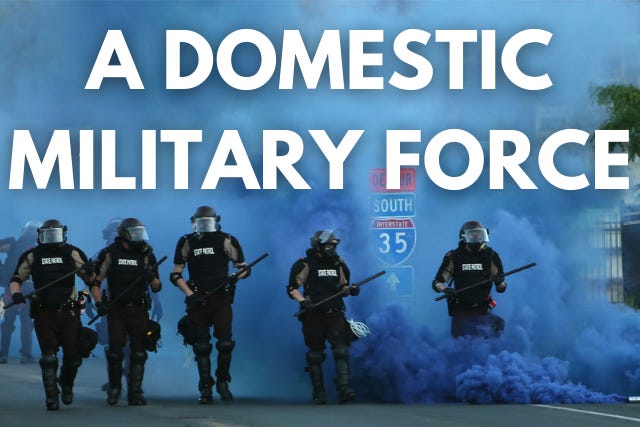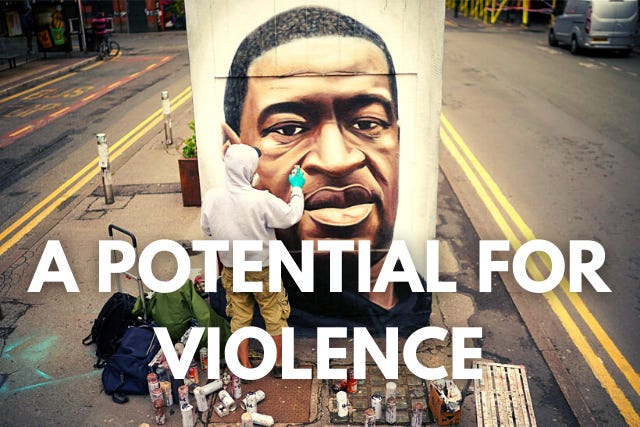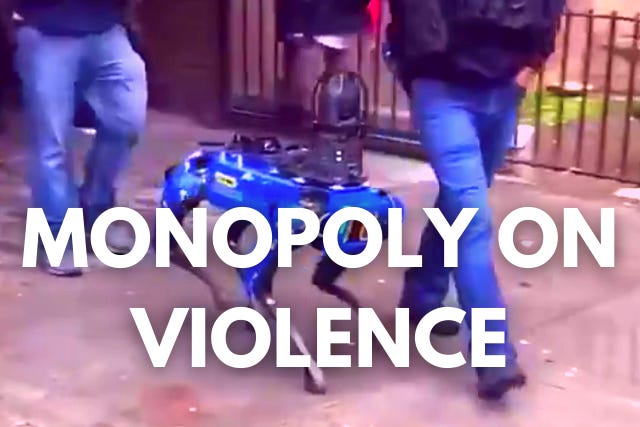A Domestic Military Force: Law Enforcement As An Occupying Power
Our police have been turned into a standing army charged with suppressing any possible threat to power and wealth, real or imagined
It’s almost too much to keep track of sometimes.
While Derek Chauvin is on trial for the murder of George Floyd - his defense, as it almost always does, involves drugs and wrongdoing by the Black victim - Daunte Wright is cut down by an officer claiming they intended to fire a taser instead of their sidearm.
All of it is grotesque. Cruel. Numbingly awful. To view these as accidents, even isolated behaviors by prejudiced or problematic officers, would be bad enough and reason for existential reconsideration. But there is something more here. A larger, systemic issue we must face.
We recognize this in moments, such as the chilling instance in Brooklyn Center, Minnesota, where, following the murder of Daunte Wright, the police department responsible was caught raising a blue line flag.
That blue line is understood to mean that law enforcement represents the last defense between citizens and violence. Like so many of these symbols, it is both undeniable in its meaning and yet also hides a larger, more disturbing, truth.
What is law enforcement?
Who and what are they intended to protect?
And from whom?
The answer to these questions is the answer to how we solve the problem of police violence.
Dispatches From A Collapsing State is the home for Jared Yates Sexton’s political, historical, and cultural writings, and is an independent media project. This means it depends on your support and subscriptions. To keep this project free of advertising, largely independent of paywalls, and independent of editorial oversight which might restrict topics and expression, and, not to mention, gain access to additional content, please consider becoming a paid subscriber. It is incredibly appreciated and much-needed.
Modern law enforcement is a descendant of the knight class during the Middle Ages, which was charged not only with making war, but with policing the activities of peasants, collecting their taxes, restricting their movement, and suppressing any potential uprisings. Over time, city-states and cities saw a need for a force separate from the army to mitigate criminal behavior and, most importantly, protect the property of the wealthy.
At this time, the wealthy employed private security firms, bodyguards, and personal militias who were paid to oversee their property and nothing else. The wealthy saw little value in a public body patrolling the streets or looking after others. That began to change, however, as France exploded into revolution in the late 18th century and the argument was made that nation/statewide policing was necessary in order to put down rebellions before they ever began. Now, law enforcement was put into motion as a national defense against foreign antagonists, or the French revolutionaries seeking to spread their revolution, and local traitors who might assist them. Quite literally, they were an army fighting an invisible war.
To do this, police departments were enacted and worked, hand-in-hand, with Right Wing, nationalistic forces to infiltrate, disrupt, intimidate, and prosecute individuals who even so much as advocated the most modest reform as even a solitary challenge to the financial and political order was seen as a threat to the status quo.
In America, policing was embraced for the same purposes, including keeping the status quo and punishing potential change agents, but also for another purpose: the control of slaves. Men, women, and children who escaped their bondage were hunted down by lawmen, returned to their masters, punished, or killed, and the more important and vital function was to prevent the possibility of mobilized revolt by the slaves by any means necessary.
This “service” outlasted slavery itself as law enforcement shifted their prerogative from suppressing slave revolts to policing freed African Americans, who were perceived as constant potential violence should law enforcement and the threat of violence not hang constantly over their heads. This focus infected law enforcement in the post-slavery era and has, unfortunately, survived to this moment, and has been aided, in great and tragic scope, by the pushing of drug laws that exist as a tool to suppress African Americans specifically.
Still, even in the 21st century, African Americans are still seen, to a person, as agents of potential violence. They are seen as inferior, as less-than, as an “other” who, through the eyes of white supremacists, are in dire and desperate need of control. This mindset and ugly tradition still rears its head with every traffic stop, every unnecessary killing, every escalation in which an officer of the law considers an African American subject, in any situation, as a grave threat of potential violence necessitating, tragically, the use of preemptive force.
In this mindset, the freeing of the slaves, desegregation, the end of outwardly racist laws, the pursuit of equality, are all mistakes or designs of individuals, groups, and interests seeking to destroy the United States of America.
In this mindset, police are the thin blue line that protects just, rightful, wealthy, white America from the machinations of anti-American forces and the people of color they manipulate and which have no ability to differentiate right from wrong.
This is Spot. A police robot designed by Boston Dynamics, a tech firm which regularly portrays itself as a harmless body with popular videos of their newest experiments dancing or performing. For years now, critics like myself have been sounding the alarm on these developments, warning people that these robots will, eventually, undoubtedly, be deployed both in military fashions and, more worrisome, in our streets in the aid of law enforcement.
We’ve now reached that moment and, considering the spate of police violence we’ve witnessed of late, it feels even more dystopian than we could have ever imagined. With every year, American police are being more and more militarized. This is what happens when a country predicated on militarism and violence begins reckoning with the redistribution of wealth from social projects and the well-being of its citizens to the wealthiest few and the imperial projects they both require and profit from. Eventually, the consequences of those decisions leads to discord, dissatisfaction, and violence.
But the Age of Revolutions has left us with a strange paradox. Though we are a nation born of revolution, the throwing off of tyrannical oppression, we have been restricted in totality from any such action being realized ever again. It was a revolution that then sealed itself off from future revolutions, which is what revolutions tend to do. This creates what is called a monopoly on violence, or the right for a state to defend itself against citizens who have no right to defend themselves from the state.
In this time, we live in a nation that is spending noxious amounts of money creating new technologies, strategies, and in arming its law enforcement against its own people, money that could otherwise be spent actually solving the problems that help to create the discord, dissatisfaction, and violence. But because law enforcement is predicated and has its foundations on a deep distrust of both citizenry in general but in people of color especially, the issue is a philosophical matter.
This is not just about training. This isn’t about a few bad apples. It is that law enforcement, with its long history, from knights in armor chopping down serfs and disrupting peasant rebellions, to armored police units in the heartland of America rolling through streets in tanks with 21st century technology meant to suppress the people, has a fundamental problem: the belief that these forces are intended to make war with their own people in order to protect property, wealth, and power.
The problem is the very concept of the thin blue line.







The structure you describe is so systemic and longstanding that it will take some serious work to widely expose this for what it is. Thank you for your as always concise, accessible, and enlightening presentation of this political and social history.
Great writing! What can be done to change this? De-fund the police is an idea that I am wrestling with. But that's only because I don't have a clear vision of how this broken system can be fixed.